

Politics of development. Airwars - Tracking civilian casualties in Syria and Iraq. Isis: In a borderless world, the days when we could fight foreign wars and be safe at home may be long gone. Early in 2014, Isis released one of its first videos.
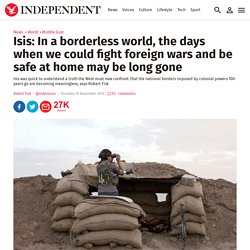
Largely unseen in Europe, it had neither the slick, cutting-edge professionalism of its later execution tapes nor the haunting “nasheed” music that accompanies most of its propaganda. Instead, a hand-held camera showed a bulldozer pushing down a rampart of sand that had marked the border between Iraq and Syria. As the machine destroyed the dirt revetment, the camera panned down to a handwritten poster lying in the sand. Activist Group - Raqqa is Being Slaughtered Silently. Varoufakis, ministro de Finanzas griego. Salvados viaja de nuevo a Atenas para entrevistar al ministro griego de Finanzas, Yanis Varoufakis, un ministro que se ha convertido en un icono en toda Europa y en un héroe en su país por plantar cara a la ‘Troika’.

El domingo, Jordi Évole conversa con Varoufakis para conocer de primera mano las opiniones de un personaje político que se ha enfrentado al Eurogrupo liderado por la todopoderosa Alemania. Entrevistado por primera vez por una televisión española, Varoufakis va respondiendo a las preguntas de Évole para afirmar que más allá de los problemas con la deuda griega, “el euro estará siempre en peligro hasta que Europa complete su unión política”. El ministro también advierte que “el gran error no fue salvar a los bancos sino salvar a los banqueros”. Kurds 'retake ground' from ISIL in Iraq. Kurdish forces backed by US-led warplanes have recaptured a large area in Iraq near the Syrian border in an offensive against the Islamic State of Iraq and the Levant (ISIL) group, a top US commander has said.
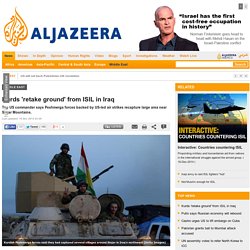
More than 50 air strikes in recent days by coalition aircraft "have resulted in allowing those [Kurdish] forces to manoeuvre and regain approximately 100 square kilometres of ground" near Sinjar, Lieutenant General James Terry, head of the US-led campaign against ISIL, told reporters on Thursday. Kurdish Peshmerga forces said earlier that they had captured several villages and were rolling back the ISIL fighters around Sinjar in the country's northwest.
Kurdish peshmerga forces launch offensive to retake Isis held areas. Iraqi Kurdish forces launched a broad offensive on Wednesday aimed at recapturing areas near the Syrian border that have been held by Islamic State (Isis) for months, officials said.
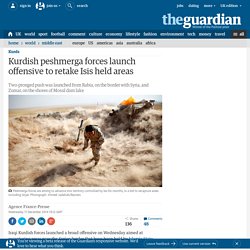
Among the goals is the Sinjar area, which was home to many members of the Yazidi minority before Isis attacked in early August and forced most of them to flee. The risk of a genocide against the Yazidis was one of the reasons Barack Obama put forward for launching a campaign of air strikes against Isis. Kurdish women a force to be reckoned with for ISIS. But as much of the rest of Syria ripped itself apart in a vicious civil war, Syria's Kurdish minority spent three years quietly building a series of mini-states in the north of the country.
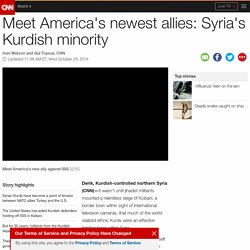
They refer to these three enclaves as Rojava. Until recently, some outside observers saw them as something of a success. "They tried to run them as pretty autonomous statelets that were actually rather admirable in some ways. They included many different ethnic groups, faith groups, and they tried to be inclusive," said Hugh Pope, a senior analyst with the International Crisis Group, a conflict mediation organization.
Inside The Chilling Online World Of The Women Of ISIS. The 15-year-old Yazidi girl captured by ISIS and sold into slavery. Girl, who has been kept anonymous, rocked back and forth as she told storyShe lived on Iraq's Mount Sinjar with religious sect when Isis militants cameThey took her to Iraqi city Mosul before marrying her off in Raqqa, SyriaShe shot her new husband and fled but was recaptured and sold for £600She fed drugs to her new captors then found a man to drive her to TurkeyOther witnesses saw regular rapes and girls in captivity as young as five By Associated Press and Dan Bloom for MailOnline Published: 18:19 GMT, 11 October 2014 | Updated: 11:38 GMT, 12 October 2014.

Surrounded by ISIS but thousands of Yazidis STILL need rescue from Mount Sinjar. Thousands of Yazidis are still trapped on Mount Sinjar, almost completely surrounded by ISIS militantsISIS cornered 50,000 in August but U.S. airstrikes held them off while Iraqi forces secured most Yazidis' rescueBut four months on, they are long-forgotten and the Islamic extremists are closing in on them once moreAround 8,000 men, women and children are said to be trapped on top of Mount Sinjar as the cold of winter bitesA handful of those trapped have been helicoptered to UN refugee camps but others rely on aid drops to survive By Ollie Gillman for MailOnline Published: 15:42 GMT, 12 December 2014 | Updated: 00:07 GMT, 13 December 2014.
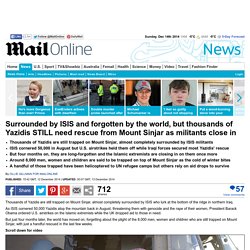
Research Paper: List of ISIS-Turkey links. Research Paper: ISIS-Turkey Links By David L.
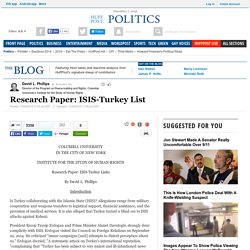
Phillips Introduction Is Turkey collaborating with the Islamic State (ISIS)? Allegations range from military cooperation and weapons transfers to logistical support, financial assistance, and the provision of medical services. President Recep Tayyip Erdogan and Prime Minister Ahmet Davutoglu strongly deny complicity with ISIS. Columbia University's Program on Peace-building and Rights assigned a team of researchers in the United States, Europe, and Turkey to examine Turkish and international media, assessing the credibility of allegations. Allegations Turkey Provides Military Equipment to ISIS • An ISIS commander told The Washington Post on August 12, 2014: "Most of the fighters who joined us in the beginning of the war came via Turkey, and so did our equipment and supplies.
" • According to CHP Vice President Bulent Tezcan, three trucks were stopped in Adana for inspection on January 19, 2014. Turkey Provided Training to ISIS Fighters Mr. 2014: The 'indigence' basic food basket in Argentina climbed 40% in 12 months. An average Argentine family during the month of April needed 4.779 Pesos (approx. 600 dollars) not to be included in the poverty category, which represents an increase of 1.6% over March, of 20% in the first four months of the year and 40.5% in the last twelve months, according to the latest report from the Latin American Economic Research Foundation, FIEL.

Saudis offer Russia secret oil deal if it drops Syria. Intercepts caught Assad rejecting requests to use chemical weapons, German paper says. Syrian President Bashar Assad has repeatedly rejected requests from his field commanders for approval to use chemical weapons, according to a report this weekend in a German newspaper.

The report in Bild am Sonntag, which is a widely read and influential national Sunday newspaper, reported that the head of the German Foreign Intelligence agency, Gerhard Schindler, last week told a select group of German lawmakers that intercepted communications had convinced German intelligence officials that Assad did not order or approve what is believed to be a sarin gas attack on Aug. 21 that killed hundreds of people in Damascus’ eastern suburbs. The Obama administration has blamed the attack on Assad. Syria’s transit future: all pipelines lead to Damascus? : OpenOil. Posted by Amrit Naresh on Wednesday, March 28, 2012 · Leave a Comment Between the rise of Hafez al-Assad in 1971 and the crisis engulfing his son’s government today, the Syrian energy sector seems to have come full circle. An oil importer in the 1950s and 60s with little production of its own, Syria became a net exporter of oil by the 1980s; it is now a country whose depleting reserves will lead to petroleum imports soon exceeding exports once again.
With oil production approaching an apparent dead end, the Syrian government – that is, whoever succeeds the lame duck regime of Bashar al-Assad – will need to lean on oil transit fees for revenues, as the government of the 50s and 60s did with the IPC pipeline from Iraq to Syria’s Mediterranean coast.